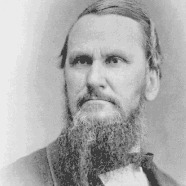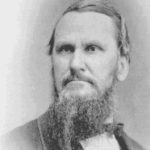
Quotes by Robert Dabney
The habit of introspection may be abused, to divert the eyes of the soul too much from Christ.
Thus follows unavoidable confusion of conscience. If the person awakened has dignity and good sense, he will probably refuse to come, and then the drift of the system is to tell him that therein he has rebelled against God and grieved the Holy Ghost; hence, groundless distraction. If he is more gullible, and goes, it is implied that he has performed a saving act, or at least one that has gratia congruens. It is in vain they disclaim; for the common sense reasons, “Why so much urgency, if the means is not truly effective of something?”
If you would make others feel, you must feel yourself… The heavenly flame must be kindled first in your own bosom, that by this law of sympathy it may radiate thence into the souls of your hearers.
Quoted by Curtis C. Thomas, Practical Wisdom for Pastors, Crossway Books, 2001, p. 241.
They who have no Bible may still look up to the moon walking in brightness and the stars watching in obedient order; they may see in the joyous sunbeams the smile of God, and in the fruitful shower the manifestation of His bounty; they hear the rending thunder utter His wrath, and the jubilee of the birds sing His praise; the green hills are swelled with His goodness; the trees of the wood rejoice before Him with every quiver of their foliage in the summer air.
The true doctrine of calling is that the man whom God has designed and qualified to preach learns his call through the Word. The Word is the instrument by which the Spirit teaches him, with prayer, that he is to preach.
Accordingly, we never find the apostle drawing a depreciated picture of woman; every allusion of his to the believing woman is full of reverent respect and honor. Among the Christian women who come into Paul’s history there is not one who is portrayed after this imagined pattern of childish ignorance and weakness. The Lydia, the Lois, the Eunice, the Phoebe, the Priscilla, the Damaris, the Roman Mary, the Junia, the Tryphena, the Tryphosa, the “beloved Persis” of the Pauline history, and the “elect lady” who was honored with the friendship of the aged John, all appear in the narrative as bright examples of Christian intelligence, activity, dignity, and nobleness.
I believe the problem you are having is this: You are attempting to remove ideas cogently out of your own head, where you should be attempting to screw them into mine.
The education of children for God is the most important business done on earth. It is the one business for which the earth exists. To it all politics, all war, all literature, all money making ought to be subordinated; and every parent especially ought to feel, every hour of the day, that next to making his own calling and election sure, this is the end for which he is kept alive by God- this is his task on earth.
Discussions: Evangelical and Theological, v. 1, by permission Banner of Truth, Carlisle, PA. 1967, p. 691.
True. It was absolutely necessary, especially after sin had entered the race that a foundation for social order should be laid down in a family government. This government could not be made consistent, peaceful or orderly by being made double-headed, for human weakness, and especially sin, would ensure collision, at least at some times, between any two human wills. It was essential to the welfare of both husband and wife and of the offspring that there must be an ultimate human head of the family. Now let reason decide, was it necessary that the man be head over the woman, or the woman over the man? Was it right that he for whom woman was created should be subjected to her who was created for him; that he who was stronger physically should be subjected to the weaker; that the natural protector should be the servant of the dependent; that the divinely ordained bread-winner should be controlled by the bread-dispenser? Every honest woman admits that this would have been unnatural and unjust. Hence God, acting, so to speak, under an unavoidable moral necessity, assigned to the male the domestic government, regulated and tempered, indeed, by the strict laws of God, by self-interest and by the most tender affection; and to the female the obedience of love. On this order all other social order depends. It was not the design of Christianity to subvert it, but only to perfect and refine it.
All who claim a supernatural inspiration must stand prepared to prove it by supernatural works.
I will grant a zealous female converts or confirms several souls by her preaching. But may she not, by this example, in the future introduce an amount of confusion, intrusion, strife, error and scandal which will greatly overweigh the first partial good? This question cannot be answered until time is ended, and it will require an omniscient mind to judge it. Thus it becomes perfectly clear that present seeming good results cannot ever be a sufficient justification of conduct, which violates the clear Word of God. This is our only sure guide.
Now, a wise God designs no clashing between his domestic and political and his church institutions. He has ordained that the man shall be head in the family, thus it would be a confusion full of mischief to make the woman head in the church. But we have seen that the right of public teaching must involve the right of spiritual rule. The woman who has a right to preach, if there be any such, ought also claim to be a ruling elder. How would it work to have husband and wife, ruler and subject, change places as often as they passed from the home to the church? We see that this amount of switching roles would result in little short of absolute anarchy.
Paul does not say that woman must not preach in public because he regards her as less pious, less zealous, less eloquent, less learned, less brave, or less intellectual, than man. Those who advocate woman’s rights have a continual tendency to confuse this issue, claiming that the apostle, when he says that woman must not do what man does, meant to disparage her sex. This is a sheer mistake. You will search in vain for any disparagement of the qualities and virtues of the female sex; and we may at this place properly disclaim all such intention also. Woman is excluded from this masculine task of public preaching by Paul, not because she is inferior to man, but simply because her Maker has ordained for her another work which is incompatible with the public preaching and teaching of the Word.
If human language can make anything plain, it is that the New Testament institutions do not permit the woman to rule or “to have authority over a man” (See 1 Tim. 2:12; 1 Cor. 11:3, 7-10; Eph. 5:22, 23; 1 Peter 3:1, 5, 6).
The Old Testament, which contained, in seed, all the principles of the New, allowed no regular church office to any woman. When a few of that sex were employed as mouthpieces of God, it was in an office purely extraordinary, and in which they could produce a supernatural attestation of their commission. No woman ever ministered at the altar, as either priest or Levite. No female elder was ever seen in a Hebrew congregation. No woman ever sat on the throne of the theocracy, except the pagan usurper and murderess, Athaliah. Now…this Old Testament principle of ministry is carried over to a degree in the New Testament where we find the Christian congregations with elders, teachers, and deacons, and its women invariably keeping silence in the assembly.
Who can believe that God’s Spirit is the agent of such anarchy as this, where the Church hold in their hands the Word, teaching them that God does not call any woman, and yet a woman insists against them that God calls her?
There can be no doubt whatever that the Spirit calls no person to do what the Word dictated by him, forbids. The Spirit cannot contradict himself. No human being is entitled to advance a specific call of the Spirit for him individually to do or teach something contrary to or beside the Scriptures previously given to the church… Hence, when a woman preacher professes to have felt this call that the Word distinctly precludes from the work…although we may ascribe her mistake to an amiable zeal, yet we absolutely know she is mistaken; she has confounded a human impulse with the Spirit’s calling.
The only teaching function ever hinted for the women is Titus 2:4 that the older women should teach these private domestic virtues to their younger sisters. Does not the apostle here assign the home as the proper sphere of the Christian woman? That is her kingdom, and not the secular workplace or the church.
The apostle expressly excludes “new converts” from office. Yet no one dreams that he would have made the newness of their salvation a ground of discrimination against their equal privileges in Christ… So every sane man would exclude children from office in the church, yet no one would disparage their equal interest in Christ… If, then, the equality of these classes in Christ did not imply their fitness for public office in the church, neither does the equality of females with males in Christ imply it.
